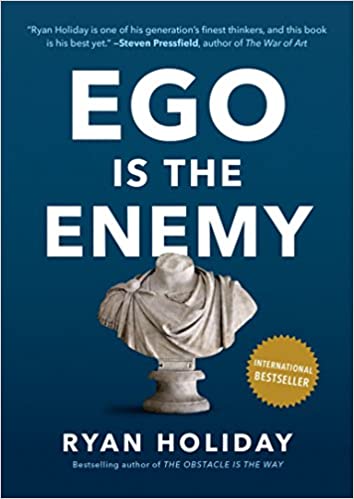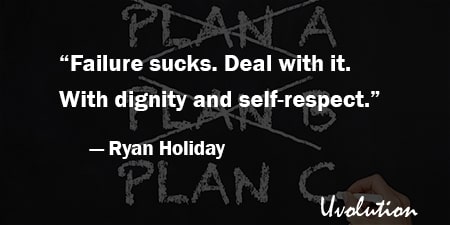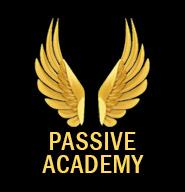Ego is The Enemy by Ryan Holiday Book Summary
The Book in 1 Sentences
“While the history books are filled with tales of obsessive, visionary geniuses who remade the world in their image with sheer, almost irrational force, I’ve found that if you go looking you’ll find that history is also made by individuals who fought their egos at every turn, who eschewed the spotlight, and who put their highest goals above their desire for recognition.
Engaging with and retelling these stories has been my method of learning and absorbing them. ... It’s always nice to be made to feel special or empowered or inspired. But that’s not
the main aim of this book.
Instead, I have tried to arrange these pages so that you might end in the same place I did when I finished writing it: that is, you will think less of yourself. I hope you will be less invested in the story you tell about your own specialness, and as a result, you will be liberated to accomplish the world-changing work you’ve set out to achieve.” ~ Ryan Holiday
8 BIG Ideas
3. Is it 10,000 or 20,000 hours to mastery?
4. Go beyond passion to purpose
5. Make it so you don’t have to fake it
Ego Is the Enemy Book Summary
1. The definition of ego
“Not that this is a book about ego in the Freudian sense. Freud was fond of explaining the ego by way of analogy—our ego was the rider on a horse, with our unconscious drives representing the animal while the ego tried to direct them.
Modern psychologists, on the other hand, use the word ‘egotist’ to refer to someone dangerously focused on themselves and with disregard for The ego we see most commonly goes by a more colloquial definition: an unhealthy belief in your own importance. That’s the definition the book will use.
It’s that petulant child inside every person, the one that chooses getting his or her way over anything else. The need to be better than, more than, recognized for, far past any reasonable utility—that’s ego. It’s the sense of superiority and certainty that exceeds the bounds of confidence and talent.”
“It’s when the notion of ourselves and the world grows so inflated that it begins to distort the reality that surrounds us. When, as the football coach Bill Walsh explained, ‘self-confidence becomes arrogance, assertiveness becomes obstinacy, and self-assurance becomes reckless abandon.’ This is the ego, as the writer Cyril Connolly warned, that ‘sucks us down like the law of gravity.’
In this way, ego is the enemy of what you want and of what you have: Of mastering your craft. Of real creative insight. Of working well with others. Of building loyalty and support. Of longevity. Of repeating and retaining your success. It repulses advantages and opportunities. It’s a magnet for enemies and errors.”
2. Focus on the long term
“If you want to be more than a flash in the pan, you must be prepared to focus on the long term. We will learn that though we think big, we must act and live small in order to accomplish what we seek.
Because we will be action and education focused, and forgo validation and status in their pursuit, our ambition will not be grandiose but iterative—one foot in front of the other, learning and growing and putting in the time.
With their aggression, brashness, intensity, selfishness, self-absorption, endless self-promotion, and impulsiveness, our competitors don’t realize how they jeopardize their own efforts (to say nothing of their sanity). We will challenge the myth of the self-assured genius for whom doubt and introspection is foreign, as well as challenge the myth of the pained, tortured artist who must sacrifice his health for his work.”
3. Is it 10,000 or 20,000 hours to mastery?
“Is it ten thousand hours or twenty thousand hours to mastery? The answer is that it doesn’t matter. There is no end zone. To think of a number is to live in a conditional future. We’re simply talking about a lot of hours—that to get where we want to go isn’t about brilliance, but continual effort.
While that’s not a terribly sexy idea, it should be an encouraging one. Because it means it’s all within reach—for all of us, provided we have the constitution and humbleness to be patient and the fortitude to put in the work.”
“Ego doesn’t allow for proper incubation either. To become what we ultimately hope to become often takes long periods of obscurity, of sitting and wrestling with some topic or paradox.
Humility is what keeps us there, concerned that we don’t know enough and that we must continue to study. Ego rushes to the end, rationalizes that patience is for losers (wrongly seeing it as a weakness), and assumes we’re good enough to give our talents a go in the world.”
4. Go beyond passion to purpose
“Is an iterative approach less exciting than manifestos, epiphanies, flying across the country to surprise someone, or sending four-thousand-word stream-of-consciousness e-mails in the middle of the night? Of course. Is it less glamorous and bold than going all in and maxing out your credit cards because you believe in yourself? Absolutely. ... Passion is form over function. Purpose is function, function, function.
The critical work that you want to do—it can be done by you alone. It will require your deliberation and consideration. Passion doesn’t help. We don’t need you to be excited or amped. The world has that in spades.
It’d be far better if you were intimidated by what lies ahead—humbled by its magnitude and determined to see it through regardless. Leave passion for the amateurs and the delusional. Make it about what you feel you must do and say, not what you care about and wish to be. Then you will do great things. Then you will stop being your old, good-intentioned, but ineffective self.”
“Passion typically masks a weakness. Its breathlessness and impetuousness and franticness are poor substitutes for discipline, for mastery, for strength and perseverance."
5. Make it so you don’t have to fake it
“Back to that popular trope: Fake it ‘til you make it. It’s no surprise that such an idea has found increasing relevance in our noxiously bullshit, Nerf world.
When it is difficult to tell a real producer from an adept self-promoter, of course some people will roll the dice and manage to play the confidence game. Make it so you don’t have to fake it—that’s the key.
Can you imagine a doctor trying to get by with anything less? Or a quarterback, or a bull rider? More to the point, would you want them to? So why would you try otherwise?
Every time you sit down to work, remind yourself: I am delaying gratification by doing this. I am passing the marshmallow test. I am earning what my ambition burns for. I am making an investment in myself instead of my ego.
Give yourself a little credit for this choice, but not so much, because you’ve got to get back to the task at hand: practicing, working, improving.”
That’s from a chapter appropriately named “Work, Work, Work.”
6. Why do you do what you do? + Euthymia
“According to Seneca, the Greek word euthymia is one we should think of often: it is the sense of our own path and how to stay on it without getting distracted by all the others that intersect it.
In other words, it’s not about beating the other guy. It’s not about having more than the others. It’s about being what you are, and being as good as possible at it, without succumbing to all the things that draw you away from it.
It’s about going where you set out to go. About accomplishing the most that you’re capable of in what you choose. That’s it. No more and no less.
So why do you do what you do? That’s the question you need to answer. Stare at it until you can. Only then will you understand what matters and what doesn’t. Only then can you say no, can you opt out of stupid races that don’t matter, or even exist.
Only then is it easy to ignore ‘successful’ people, because most of the time they aren’t—at least relative to you, and often even to themselves. Only then can you develop that quiet confidence Seneca talked about.”
“Find out why you’re after what you’re after. Ignore those who mess with your pace. Let them covet what you have, not the other way around. Because that’s independence. That’s contentment.”
7. False hope
“What we need to see is that we are not failures, we’re just experiencing failure. We need to embody what’s come to be known as the Stockdale Paradox, based on the philosopher soldier James Stockdale, who spent seven years in a North Vietnamese prison camp.
On the one hand, to survive such an ordeal you must have deep faith in yourself and your ability to persevere. On the other, you must be realistic about your situation and surroundings.
False hope is not your friend; like ego, it betrays you in the toughest moments.”
“We’re afraid to lose and fail because we think it says something about us. It doesn’t. Success didn’t either. All that failure says is that there is a chance to improve and better understand yourself.”
“Failure sucks. Deal with it. With dignity and self-respect.”
8. Training was like sweeping the floor
“My friend the philosopher and martial artist Daniele Bolelli once gave me a helpful metaphor. He explained that training was like sweeping the floor. Just because we’ve done it once, doesn’t mean the floor is clean forever. Every day the dust comes back. Every day we must sweep. ...
Every day for the rest of your life you will find yourself at one of three phases: aspiration, success, failure. You will battle the ego in each of them. You will make mistakes in each of them.
You must sweep the floor every minute of every day. And then sweep again.”
That was my QUICK summary of the great book Ego is The Enemy by Ryan Holiday. If you’re interested, get your copy. There is a HUGE amount of life-changing ideas in this book, and we’ve only touched on a tiny bit of it.
Buy The Book: Ego is The Enemy by Ryan Holiday

GET Blinkist 7 Days FREE Trial
3000+ Book Summaries
(Audio and Text)








